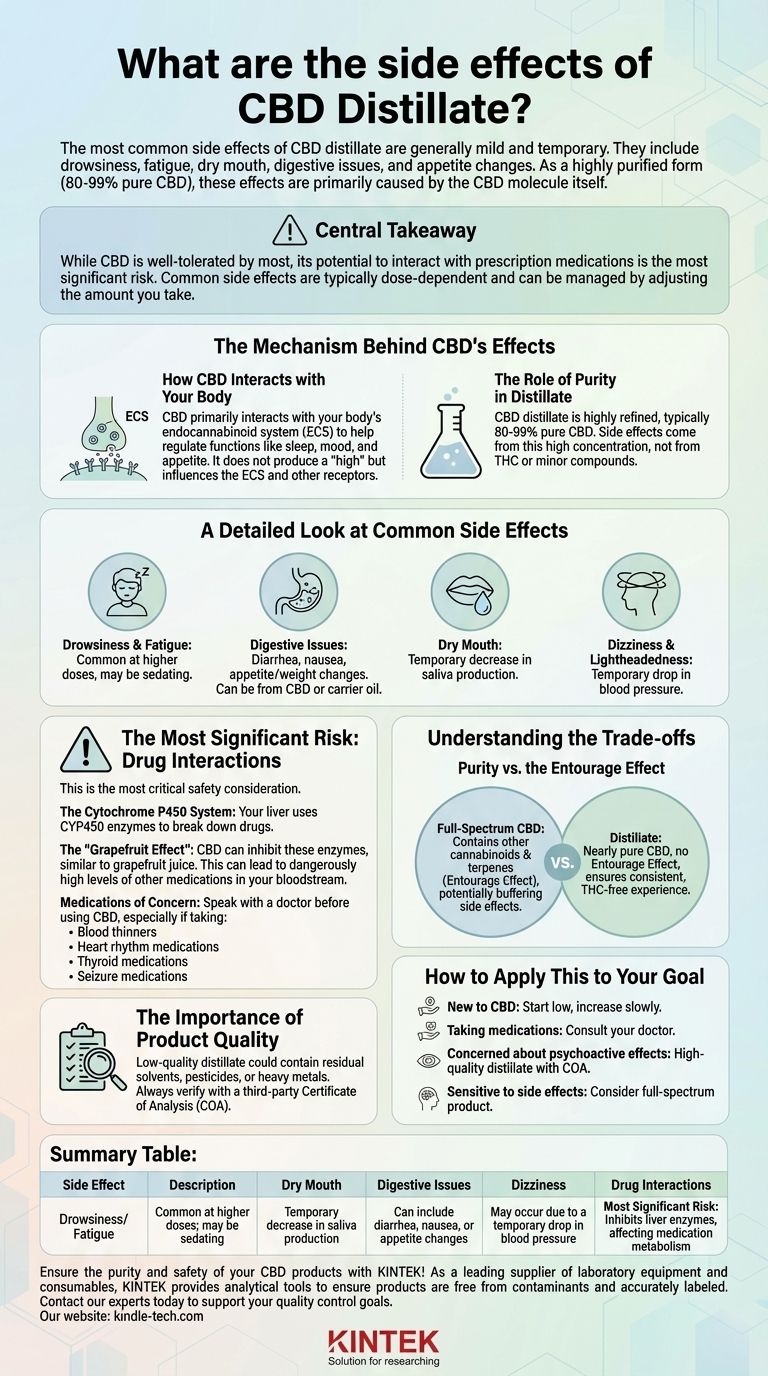The most common side effects of CBD distillate are generally mild and temporary. They include drowsiness or fatigue, dry mouth, digestive issues like diarrhea, and changes in appetite. Because CBD distillate is a highly purified form of CBD, these effects are primarily caused by the CBD molecule itself rather than other cannabis compounds.
The central takeaway is that while CBD is well-tolerated by most, its potential to interact with prescription medications is the most significant risk. The common side effects are typically dose-dependent and can often be managed by adjusting the amount you take.

The Mechanism Behind CBD's Effects
To understand the side effects, it's helpful to first understand how CBD works in your body. This context is crucial for making an informed decision.
How CBD Interacts with Your Body
CBD (cannabidiol) primarily interacts with your body's endocannabinoid system (ECS). The ECS is a complex cell-signaling network that helps regulate functions like sleep, mood, appetite, and immune response.
Unlike THC, CBD doesn't produce a "high." Instead, it influences the ECS and other receptors in the body, which is how it produces its therapeutic effects and, in some cases, its side effects.
The Role of Purity in Distillate
CBD distillate is a highly refined cannabis extract that has been purified to isolate a single cannabinoid, almost always CBD.
This means the product is typically 80-99% pure CBD. The potential side effects come directly from this high concentration of CBD, not from other cannabinoids like THC or minor plant compounds.
A Detailed Look at Common Side Effects
These side effects are the most frequently reported. They are often mild and may lessen as your body adjusts.
Drowsiness and Fatigue
This is one of the most common side effects. At higher doses, CBD can have a sedating effect, which may be desirable for those using it for sleep but can be a drawback for daytime use.
Digestive Issues
Some users experience diarrhea, nausea, or changes in appetite and weight. This can be caused by the CBD itself or by the carrier oil (like MCT oil) it's mixed with.
Dry Mouth
Often called "cottonmouth," this occurs because cannabinoids can interact with receptors in the salivary glands, temporarily decreasing saliva production.
Dizziness or Lightheadedness
In some individuals, high doses of CBD can cause a small, temporary drop in blood pressure, which may result in a brief feeling of lightheadedness.
The Most Significant Risk: Drug Interactions
This is the most critical safety consideration when using CBD distillate. Understanding this risk is non-negotiable for anyone taking other medications.
The Cytochrome P450 System
Your liver uses a family of enzymes called cytochrome P450 (CYP450) to break down and metabolize the vast majority of prescription drugs.
The "Grapefruit Effect"
CBD can inhibit these CYP450 enzymes. This is the same mechanism seen with grapefruit juice, which is why doctors warn patients not to consume it with certain medications.
When these enzymes are inhibited, your body can't break down other drugs as effectively. This can lead to dangerously high levels of those medications in your bloodstream, increasing the risk of negative side effects or overdose.
Medications of Concern
It is essential to speak with a doctor before using CBD if you take any prescription medication, especially:
- Blood thinners like warfarin
- Heart rhythm medications
- Thyroid medications
- Seizure medications
Understanding the Trade-offs
The choice of CBD distillate over other forms, like full-spectrum oil, involves specific trade-offs related to its potential effects.
Purity vs. the Entourage Effect
Full-spectrum CBD products contain other cannabinoids and terpenes that work together in what is known as the "entourage effect." Some research suggests these compounds may buffer some of CBD's side effects.
Distillate, being nearly pure CBD, lacks these other compounds. This ensures you get a consistent, THC-free experience but forgoes any potential benefits of the entourage effect.
The Importance of Product Quality
The side effects of a product aren't always from the CBD. A low-quality distillate could contain residual solvents, pesticides, or heavy metals from the extraction process.
These contaminants can cause their own set of adverse effects. Always verify a product's purity and safety with an up-to-date, third-party Certificate of Analysis (COA).
How to Apply This to Your Goal
Your approach to using CBD distillate should be guided by your health profile and goals.
- If you are new to CBD: Start with the lowest possible dose and increase it slowly over several days or weeks until you find the minimum amount that works for you.
- If you take any prescription medications: Do not use CBD without first consulting your doctor to discuss the significant risk of drug interactions.
- If you are concerned about psychoactive effects: A high-quality CBD distillate is an excellent choice, as it should be verified by a COA to contain non-detectable levels of THC.
- If you are sensitive to side effects: Consider starting with a full-spectrum product, as the entourage effect may potentially moderate some of CBD's effects for certain individuals.
Ultimately, understanding these factors empowers you to approach CBD with the caution and confidence needed to make a safe, informed health decision.
Summary Table:
| Side Effect | Description |
|---|---|
| Drowsiness/Fatigue | Common at higher doses; may be sedating. |
| Dry Mouth | Temporary decrease in saliva production. |
| Digestive Issues | Can include diarrhea, nausea, or appetite changes. |
| Dizziness | May occur due to a temporary drop in blood pressure. |
| Drug Interactions | Most Significant Risk: Inhibits liver enzymes, affecting medication metabolism. |
Ensure the purity and safety of your CBD products with KINTEK!
As a leading supplier of laboratory equipment and consumables, KINTEK provides the analytical tools and supplies necessary for producing and verifying high-quality CBD distillate. Our equipment helps manufacturers ensure their products are free from contaminants and accurately labeled, empowering you to deliver safe, effective products to your customers.
Contact our experts today to discuss how our solutions can support your quality control and production goals. Reach out via our contact form to get started.
Visual Guide

Related Products
People Also Ask
- What is the delta 20 rule of evaporation? Master Safe and Effective Spraying
- How are electron beams made? From Thermionic to Field Emission Explained
- How are rock samples prepared for geochemical analysis? Ensure Accurate Results with Proper Lab Protocols
- What is the process of pyrolysis in biomass energy? A Guide to Converting Biomass into Biofuel, Biochar, and Syngas
- What are the advantages of DC magnetron sputtering? High-Speed, High-Quality Thin Film Deposition
- Is it economically viable to recycle plastic? The Harsh Economic Reality of Plastic Recycling
- Which two types of heating technologies are used in heat treatments? Fuel-Fired vs. Electric Heating Explained
- What is the first step of the biomass conversion into energy? Choose the Right Pathway for Your Feedstock
